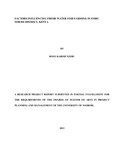| dc.description.abstract | Kenya Vision 2030 is the country’s new development covering the period 2008 to 2030 and it
aims at transforming Kenya into a newly industrialised middle-income country providing a high
quality life to all its citizens by the year 2030. In a bid to realise vision 2030 strategic plan, the
Kenyan government injected 70 million U.S. dollars between 2009 and 2013 financial years to
invest in fish farming for food security under the social economic pillar. However, demand for
fish in Kenya has been on the increase, while the supply of fresh water fish from capture
fisheries has been on the decline in the first decade. As world fish catches continue to decline
and population continue to increase, aquaculture has great potential for growth in Kenya to
produce the critical volumes of fish to fill the growing gap between National fish supply and
demand. Literature reviewed showed that fresh water fish farming brings forth to sustainable
development and is a pathway towards achievement of first millennium development goal on
eradication of extreme hunger and poverty. This study therefore sought to examine the factors
influencing fresh water fish farming in Embu North District. The specific factors which were
assessed include; ecological factors, social economic factors, training and extension services and
the influence of marketing on fresh water fish farming in Embu North District. The significant of
this study is to improve the fresh water fish farming in terms of revenue, efficiency and
expansion hence enabling the government’s economic growth for the achievement of millennium
development goals and vision 2030. This will consequently improve the living standards of
majority of Kenyans who are struggling to make a living. The researcher employed a descriptive
research design. The target population for this study was 164 respondents .The study took a
census of 164 respondents from Embu North District. Data collected using questionnaires was
analysed by the use of descriptive statistics using the Statistical Package for Social Sciences and
MS Excel and was presented using percentages and means. The information was written in prose
and presented using tables. The study showed that majority (50.3%) of respondents stocked
Tilapia. The research further showed that availability of capital was the main determinant of the
number of fish ponds each farmer had according to 49.7% of respondents .The study showed
that majority (55.9%) of respondents had not experienced any fish problem and diseases
however,34.8% of respondents experienced fish stress due to lack of oxygen in the pond. The
study also showed that 68% of respondents had the problem of pollution from farm chemicals
however left over feeds and excess feeds followed .The study showed that birds were the main
fish predators as indicated by 64.6% of respondents followed by snakes and otter .The study also
showed that Combination of agriculture and aquaculture improved food supply in Embu North
District. The study indicated that majority (86.3%) of the respondents sold their raw fish to local
markets. The main conclusion of the study is that fresh water fish farming is highly influenced
by the type of fish species stocked, availability of clean water, favourable environment in the
pond, availability of market and farm inputs. The recommendations of the study shows that the
Government should join hands with private partners to come up with quality fish species,
subsidized farm inputs, come up with policies and regulations on pond pollution from farm
chemicals and lastly further research and development especially on fish diseases and other
innovations on fish culture and management systems which is a vehicle towards sustainable
fresh water fish farming. The study will benefit Government officers, fish service providers,
farmers, future researchers and other stakeholders. | en |

